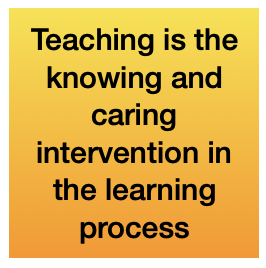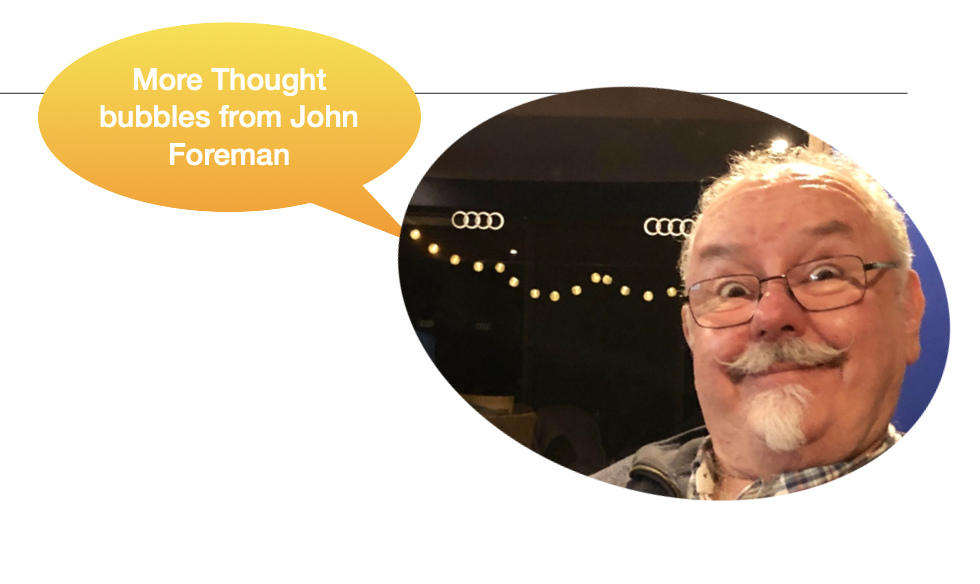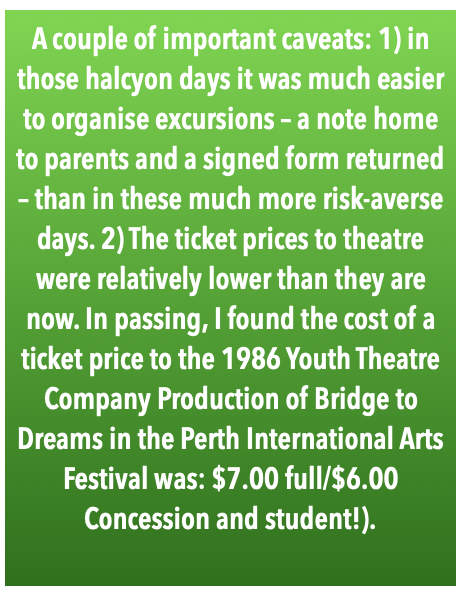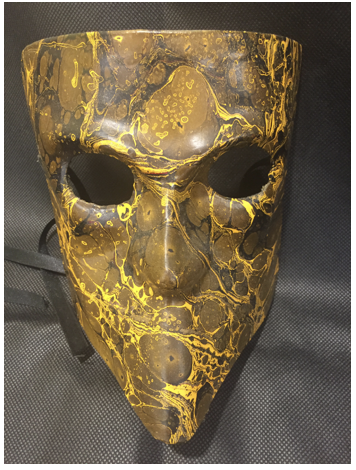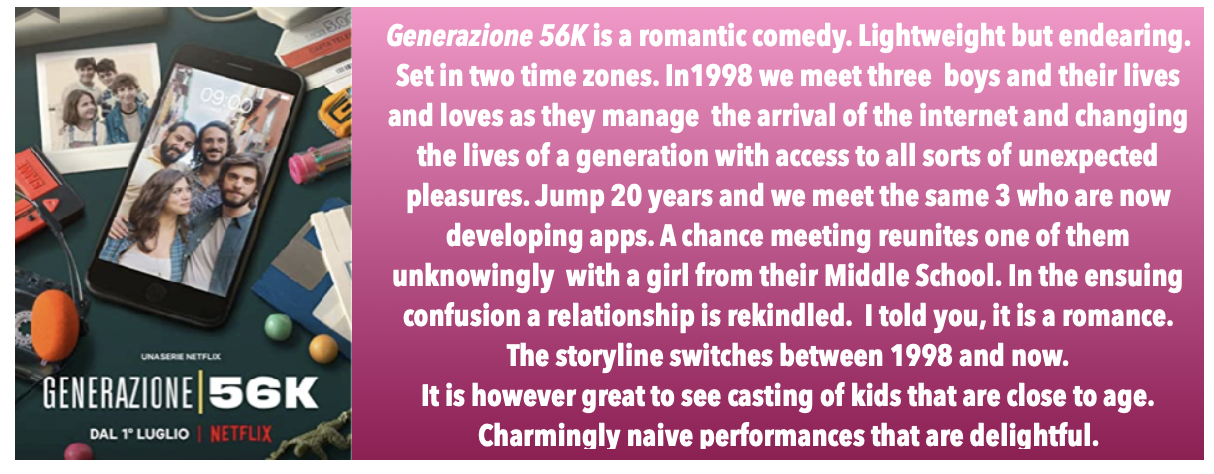Drama Tuesday - World Teacher Day 2021
/What makes a memorable Drama Teacher?
On World Teacher Day I pose a simple challenge: who are the inspirational, unforgettable, indelible, significant, impressive, illustrious, brilliant, timeless drama teachers in your lives?
And why are they so memorable?
The drama teachers who I remember –
Know drama and theatre
Know how to teach drama and theatre
Always learning and reflecting
Care about the learning of their students
Know curriculum, progression in learning drama and assessment that matches drama to students’ ages and stages of development
Model effective drama teaching and learning
Advocate for drama
Confidently understand their role and purpose
Or to share this graphically:
Of course there are academic words for all this.
Teach drama focuses on embodied learning in the arts (Bresler, 2004). Through practical, hands-on experiences in drama, we model the ways that students learn the arts and ways they are taught. This engenders embodied teaching.
This approach is based on sound research about providing:
Analogue experiences – these are experiences like the ones students in drama experience, providing teachers with similar learning experiences that they need to facilitate for their students (Borko & Putnam, 1995; Morocco & Solomon, 1999).
Content focus – unambiguous content description (Desimone, Porter, Garet, Yoon, & Birman, 2002; S.Garet, Porter, Desimone, Birman, & SukYoon, 2001; Shulman, 1986).
Active learning – where teachers are engaged in the analysis of teaching and learning; learning from other teachers and from their own teaching; reviewing examples of effective teaching practice (Desimone et al., 2002; Franke, Fennema, & Carpenter, 1997; Morocco & Solomon, 1999; S.Garet et al., 2001).
Dialogue amongst teachers – belonging to a community of drama teachers participating in discussion with practising teachers (T. R. Guskey, 1986, 2003; Virginia Richardson, October 1990).
Long-term support and feedback – support beyond the immediate experiences in the workshop through enrolling in a community of drama teachers (Borko & Putnam, 1995; T.R. Guskey, 2002).
This is an articulated theoretical framework for drama teacher education course design that steps beyond pragmatic functionalism. It is a framework informed by Dewey, Vygotsky, Bruner, Eisner, Greene and others. Learning to teach drama involves acts of purposeful meaning-making that draw together personal experiences and those of others (Dewey, 1938; Eisner, 2002). No one learns alone (Grumet, 2004; Vygotsky, 1978). Drama teachers learn cognitively, somatically and affectively – mind, body and spirit (Peters, 2004). They work with enactive, iconic and symbolic modes (Bruner, 1990). Learning to teach drama engages aesthetic imagination (Greene, 1995). Learning to teach drama involves proactive participation in communities of practice (Wenger, 1998). Learning to teach drama organises drama knowledge, categorises it and uses strategies of paradigmatic thinking and narrative building (Bruner, 1991).
Extract from chapter about drama teacher education in a forthcoming book
But you can sum up all these ideas:
Memorable Drama Teachers know their stuff… They get their act together and take it on the road everyday…
Bibliography
Borko, H., & Putnam, R. T. (1995). Expanding a teacher’s knowledge base: A cognitive psychological perspective on professional development. In T. R. Guskey & M. Huberman (Eds.), Professional Development in Education. New York: New York: Teachers College Press.
Bresler, L. (2004). Knowing Bodies, Knowing Minds - Towards Embodied Teaching and Learning. Dordrecht: Kluwer Academic.
Bruner, J. (1990). Acts of Meaning. Cambridge, MA: MIT Press.
Bruner, J. (1991). The Narrative Construction of Reality. Critical Inquiry, 18(1), 1-21. Retrieved from http://www.jstor.org/stable/1343711
Desimone, L. M., Porter, A. C., Garet, M. S., Yoon, K. S., & Birman, B. F. (2002). Effects of Professional Development on Teachers' Instruction: Results from a Three-Year Longitudinal Study. Educational Evaluation and Policy Analysis, 24(2 (Summer 2002)), 81-112. Retrieved from http://www.jstor.org/stable/3594138
Dewey, J. (1938). Experience & Education. New York, NY: Kappa Delta Pi.
Eisner, E. W. (2002). What can eduction learn from the arts about the practice of education? John Dewey Lecture for 2002, Stanford University. Retrieved from www.infed.org/biblio/eisner_arts_and_the_practice_or_education.htm . Last updated: April 17, 2005.
Franke, M., Fennema, E., & Carpenter, T. (1997). Teachers creating change: Examining evolving beliefs and classroom practice. In E. Fennema & B. Scott-Nelson (Eds.), Mathematics teachers in transition (pp. 255-282). Mahwah: Lawrence Erlbaum Associates.
Greene, M. (1995). Releasing the Imagination: Essays on Education, The Arts and Social Change. San Francisco: Jossey-Bass.
Grumet, M. (2004). No one learns alone. In N. Rabkin & R. Redmond (Eds.), Putting the Arts in the Picture: Reframing Education in the 21st Century, (pp. 49–80). Chicago, IL: Columbia College Chicago.
Guskey, T. R. (1986). Staff development and the process of teacher change. Educational Researcher, 15, 5-12.
Guskey, T. R. (2002). Professional development and teacher change. Teachers and Teaching: Theory and Practice, 8, 381-391.
Guskey, T. R. (2003). Scooping up meaningful evidence. Journal of Staff Development, 24(4), 27-30.
Morocco, C. C., & Solomon, M. Z. (1999). Revitalising professional development. In M. Z. Solomon (Ed.), The diagnostic teacher: Constructing new approaches to professional development (pp. 247-267). New York: Teachers College Press.
Peters, M. (2004). Education and the Philosophy of the Body: Bodies of Knowledge and Knowledges of the Body. In L. Bresler (Ed.), Knowing Bodies, Moving Minds - Towards Embodied Teaching and Learning. Dordrecht: Kluwer Academic Publishers.
S.Garet, M., Porter, A. C., Desimone, L., Birman, B. F., & SukYoon, K. (2001). What Makes Professional Development Effective? Results From a National Sample of Teachers. American Educational Research Journal. doi:https://doi.org/10.3102/00028312038004915
Shulman, L. (1986). Those who understand: Knowledge growth in teaching. Educational Researcher, 15(2), 4-14.
Virginia Richardson. (October 1990). Significant and Worthwhile Change in Teaching Practice. Educational Researcher, 19(7), 10-18. doi:10.2307/1176411
Vygotsky, L. S. (1978). Mind in Society: The Development of Higher Psychological Processes. Cambridge, MA: Harvard University Press.
Wenger, E. (1998). Communities of practice: Learning, meaning, and identity. Cambridge: Cambridge University Press.



